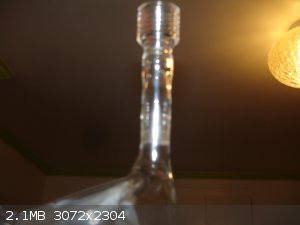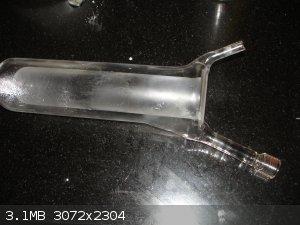SWIM
National Hazard
   
Posts: 970
Registered: 3-9-2017
Member Is Offline
|
|
Does this look like a graded seal to you?
So I got this photochemical reactor well in the mail.
The threaded fitting on the top is marked Ace, but there are no other marks on it.
Thing is, the threaded fitting is joined to the well by an odd looking bit of tubing that kinda looks like several pieces fused together.
I'm wondering if this could be a graded seal.
I'm also curious about the cloudiness in the well, as there really isn't any reason for anything corrosive to have ever gone in there.
Doesn't fused quartz cloud up like that sometimes if you get it too hot?
Maybe this is just wishful thinking on my part, but I'm wondering if this is a quartz well somebody made and fused a regular Ace Boro threaded fitting
on it with a graded seal.
I've got an Ace-manufactured quartz well (different size), and it has a fitting on the top which I think is a quartz Ace-thread fitting as opposed to
what I think is boro and graded seal on the well pictured here.
 
EDIT: just checked the Ace made quartz well. The threaded fitting is on a smooth tube looking unlike that one on the well pictured.
[Edited on 22-4-2020 by SWIM]
|
|
|
Chemetix
Hazard to Others
  
Posts: 376
Registered: 23-9-2016
Location: Oztrayleeyah
Member Is Offline
Mood: Wavering between lucidity and madness
|
|
Quartz gets foggy or 'solarised' when it's exposed to uv for a long time, so it could be from that. Best way to check a graded seal is with polarized
light, it will show the different glasses and the residual stress in the glass. It's impossible to anneal a graded seal so it will show up.
|
|
|
Dr.Bob
International Hazard
    
Posts: 2750
Registered: 26-1-2011
Location: USA - NC
Member Is Offline
Mood: No Mood
|
|
Put a fluorescent TLC plate inside and see if the UV goes through the glass. If so, the plate will fluoresce, if borosilicate, the UV will not make
it to the plate, you can check each piece for UV transmission. The few quartz items I have are easy to tell that way. I actually have some tubes
like that which I should test, as they might well be quartz, but not sure. I like the old way if doing photochemistry from college, put the reaction
in a glass baking dish and sit it up on the roof for a few hours.
|
|
|